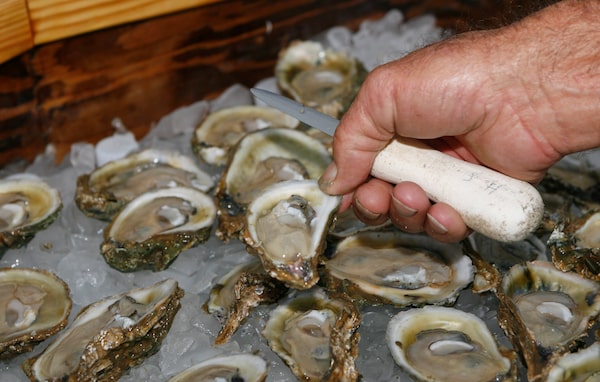
Oysters top the list of zinc-rich foods, providing 28 mg per three ounce serving. In this Aug. 13, 2013, file photo, oysters are displayed in Apalachicola, Fla.Phil Sears/The Associated Press
As people seek out ways to support their immune system during the pandemic, “immune” supplements have become popular. Along with vitamins C and D and probiotics, the interest in zinc has also grown.
While there’s no conclusive evidence that the mineral can help with COVID-19, consuming enough zinc is essential for the proper development and function of immune cells. If you’re zinc deficient, your body will be less effective at fighting off disease-causing microbes.
When it comes to zinc, however, more is not better (as is the case for most nutrients). Taking too much zinc can weaken your immune system rather than strengthening it.
Here’s what to know about zinc and zinc supplements.
What does zinc do?
Besides supporting the immune system, zinc is needed for protein and DNA synthesis, wound healing, thyroid function and blood clotting. And it’s crucial for proper growth and development during pregnancy, childhood and adolescence.
Zinc also plays a role in controlling blood sugar and helps maintain healthy vision by protecting the eye’s retina from oxidative damage. As well, the mineral maintains our sense of taste and smell.
How much, foods and supplements
Healthy adults require 8 mg (women) and 11 mg (men) per day. Growing children need 3 to 8 mg, depending on age, and teenagers should get 9 mg (girls) and 11 mg (boys) daily.
Oysters top the list of zinc-rich foods, providing 28 mg per three ounce serving. Lobster, crab and beef are also excellent sources with 3.5 (lobster) to 4.6 mg (crab, beef) per three ounces.
You’ll also find zinc in milk, yogurt, cheese, eggs and fortified foods such as breakfast cereals and plant-based beverages. Pumpkin seeds, cashews, chickpeas, lentils, kidney beans, quinoa, oatmeal and many other whole grains also contain a decent amount of zinc.
While still good sources, zinc is less available from plant foods than animal foods. That’s because whole grains, pulses, nuts and seeds contain phytates, natural compounds that bind to zinc, preventing some it from being absorbed.
Soaking whole grains, beans and lentils in water for several hours before cooking can reduce phytates and increase the amount of zinc that’s available for absorption. So can sprouting.
Zinc is found in multivitamin and mineral supplements and may also be added to calcium supplements and combination products for bone health and immune health. You can also buy zinc separately as zinc gluconate, zinc sulfate, zinc acetate or zinc picolinate. (There’s no evidence that one form is better than another.)
Individuals at risk for zinc deficiency include vegetarians (zinc requirements may be 50 per cent higher), older adults, people with inflammatory bowel disease and people with alcohol dependency.
How much is too much?
The safe upper daily limit of zinc for adults – from supplements and food combined – is 40 mg. Long-term intakes above this 40 mg increase the risk of health problems.
Higher amounts of zinc can interfere with copper absorption, which could lead to copper deficiency and its associated anemia. Even taking 50 mg of zinc for a period of weeks has been shown to reduce copper absorption.
Other consequences of excess zinc include impaired immune function, reduced levels of HDL (“good”) cholesterol, nausea, loss of appetite, diarrhea, headaches and abdominal pain.
Taking zinc lozenges to shorten the duration of the common cold (e.g., 50 to 180 mg per day for two weeks) has not been shown to have adverse health effects.
Taking high dose zinc supplements can also interfere with certain antibiotics such as tetracycline and quinolone antibiotics. Zinc supplements should be taken at least two hours apart from these drugs.
Zinc supplements should also be separated from calcium and iron pills since these minerals compete with each other for absorption in the small intestine.
Bottom line
To ensure you’re getting enough zinc, focus on food sources first. Vegetarians should include a number of zinc-rich plant foods in their daily diet.
If you’re concerned that your regular diet doesn’t provide adequate zinc, consider taking a multivitamin and mineral supplement. Most products provide 5 to 15 mg of the mineral, but some contain more, so be sure to check labels.
Leslie Beck, a Toronto-based private practice dietitian, is director of food and nutrition at Medcan. Follow her on Twitter @LeslieBeckRD
Sign up for the weekly Health & Wellness newsletter for the latest news and advice.
 Leslie Beck
Leslie Beck